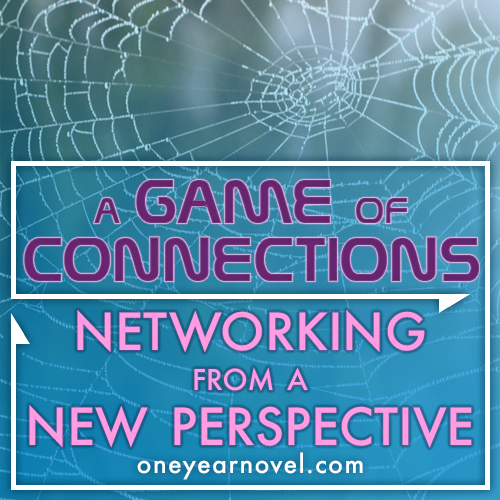A Game of Connections: Networking from a New Perspective
 By J. Tobias Buller, Student Contributor
By J. Tobias Buller, Student Contributor
Not too long ago, I was reading an author page on Facebook. The posts were peppy, with a lot of eye-catching pictures, and without fail, the author closed the post with a question designed to engage the reader. “What book are you currently reading?” and “What’s YOUR favorite way to drink coffee? Let me know in the comments!” and “Give a heart react if so-and-so is your favorite character!”
Exhausted by the effort of reading these impossibly energetic posts, I thought to myself, If this is networking, count me out.
Networking lingo gets thrown around a lot in the publishing world. It’s often associated with too-many-handshakes at writing conferences, aggressive elevator pitches, and overly-caffeinated Facebook posts. Read this, follow that, and stay connected!
If you’re like me, you find it kind of gross. Maybe I’m just a cynic, but the typical approach to networking strikes me not only as grunt work, but inauthentic. I don’t like “using” people to get a platform. Plus, I’m not really peppy, I don’t get to read nearly as often as I’d like to, and writing is ridiculously hard work. If I had an Instagram, I’d post an honest picture of an empty cup of coffee. The caption: “I don’t have money to buy more coffee, and I only wrote 120 words.”
But despite this desire to stay authentic, there remains a real need to network. You cannot advance yourself or your work without a solid list of professional contacts. Unfortunately, our usual approach not only feels inauthentic but morally questionable. As a Christian, there usually is something “icky” about the word ambition, and networking to advance your career feels like the work of the devil. What we have to do, then, is reclaim networking and rephrase ambition—a positive, authentic path forward.
You see, there is another way. And to get there, I want to reframe the very idea of networking—in fact, I’m going to abandon that word altogether, in favor of the word connecting.
As much as I’d like to idealize publishing, the industry is not usually centered around quality or art, and having a darn good novel doesn’t mean that you’re going to get a contract and a hefty advance. More than anything, publishing is about connections. The old adage is true: “It’s not what you know, but who you know.” However, many authors assume that networking has to be work—that it’s all about gaining leverage and name-dropping at just the right time. And yes, there is a place for those things, but I want to tell you something revolutionary: making connections doesn’t have to be work. The most effective networking isn’t work at all—it’s enjoyable. In fact, it’s something of a game.
I stumbled into this realization by accident. For six weeks this summer, I interned at Alive Literary Agency. I got to meet a lot of important people in the publishing industry. These meeting opportunities went a lot like this: I would connect over mutual friends, talk about great books, and ask about the publishing process—and to my surprise, I found the whole thing immensely enjoyable. It wasn’t until afterward that I realized I had gained a lot of important contacts that could prove crucial in my career. I had played the “game of connections” for six weeks before discovering just how useful it was.
This “game of connections” has simple rules: get to know people, and talk about what you have in common, such as literary interests or acquaintances. Like two Mennonites who want to find out if they’re related to one another, making publishing connections is about asking sincere questions and being genuinely interested in other people.
This strategy works because it’s an essentially human strategy. Publishing is no different from the rest of life: it’s about relationships. In many ways, the most fulfilling events in our lives are centered around our communities, places where we connect to other people. It follows that the most fulfilling approach to networking is one that prioritizes relationships with others. Networking, as many writers conceive of it, is a robotic, mathematical strategy. X connection plus Y social media presence equals Z success. It’s exhausting because it’s not the way we were meant to function.
The game of connections should be focused on meaningful relationships. If you want to make an impression on an important figure in the industry, don’t focus on making an impression. Focus on asking them thoughtful questions. Find common ground. And guess what? It’s okay to geek out over your favorite stories, because editors and publishers are people too.
Here’s an example. Several weeks back, I visited a faith-based division of Penguin Random House. In casual conversation, I mentioned Jeffrey Overstreet, a writer and film critic I have a great deal of respect for. As I was passing by the next office, the editor in the office called out to me and said, “Hey, I don’t mean to interrupt, but I heard you mention Jeffrey Overstreet and I just couldn’t help myself.” We went on to have a really great conversation about art and fiction, and he gave me his business card. I now have the full contact information of an editor at a major publishing house and a memorable interaction with him—thanks to geeking out over great art.
Unlike networking, the game of connections is exciting. It means meeting interesting people and talking about great books. By shifting the focus away from creating a “network” and becoming successful, you actually strengthen your chances at gaining valuable connections. Shocking, I know, but people don’t want to be a resource—they want to be known. Focus on meeting people as people first. More often than not, those very people will end up being your greatest assets as you move forward into the industry.
Making publishing connections doesn’t involve selling your soul; it doesn’t mean that you have to force yourself into a peppy, overly-caffeinated bubble (although if the shoe fits, wear it proudly!). The game of connections means enjoying yourself and having invigorating conversations about art and literature. Not only will you make a good impression, but you’ll find—regardless of what happens with your novels or your career—that you’ve also made a few friends along the way.
…
J. Tobias Buller (better known as Jake) is a writer, reader, poet, and missionary kid with a lot of stories to tell. Growing up in Kansas and West Africa means he has a hodgepodge of perspectives that continues to inform his approach to Story. He attends Abilene Christian University in Abilene, Texas (but daydreams about returning to Kansas). He’s majoring in English and Bible, with a concentration in Biblical Text—which means that you’ll find him either reading a good book (to avoid his Greek homework), hanging out with good friends (while ignoring his Greek homework), or tearing his hair out over Greek participles.
[P.S. – His novel Chromeheads placed first in the OYAN Student Novel Contest, so that’s pretty cool too.]


